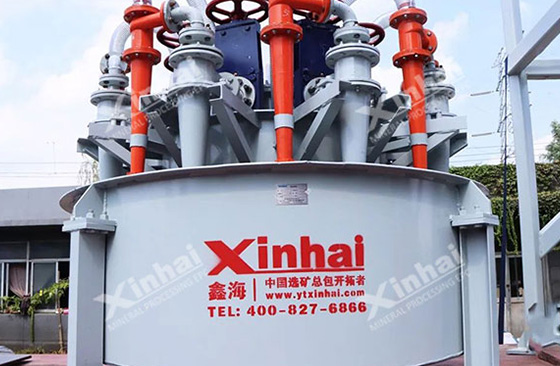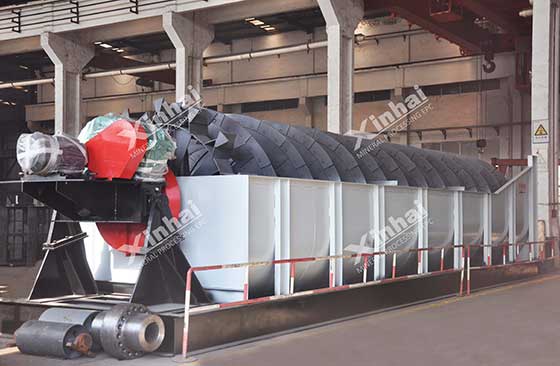
Both spiral classifier and hydrocyclone are mineral classifier. Ordinarily, the mineral classifier could be defined into four types: water-lifting hydraulic classifier, cone classifier, centrifugal classifier (hydrocyclone), mechanical classifier(rake classifier, spiral classifier, flotation tank classifier). Why we talk about spiral classifier and hydrocyclone here is that they are the main classifiers of the processing plant in our country. So here we would compare the two of them elaborately.
Spiral classifier is one of the mechanical classifiers. It consists with U-verse tank, spiral device, transmission device, lifting gear and supporting bearing.
.jpg)
Working principle of classifier
The slurry after grinding was sent to the U-verse tank from the feeding port. Through the rotation and agitation of the spiral device, light and small granules float on the surface, and overflow from the downflow dam. Thick and heavy granules sink to the bottom, and was sent to the throat through the spiral device. And then they would go into the mill for second grinding.
Two ways to separate the spiral classifier
One is by the number of the spiral axles, which could be classified as the single spiral classifier and double spiral classifier. The other way is by the height of the dam, which could separate as high dam, low dam and submerged.
Hydrocyclone is classifier equipment by centrifugal force,which consists with feeding pipe, cone container, cylinder shell, throat and downflow pipe.
Working principle of hydrocyclone
The slurry inpour the cylinder of the hydrocyclone through the pipe by the tangent direction with feeding pressure of 0.5 to 2.5 kg/cm^2. So that the slurry would go as rotation and create a huge centrifugal force, the granule of slurry by the centrifugal force, the thicker was thrown to the wall and sink by spiral stream expelling from the throat; the smaller float with water in the center by the up-flow spiral stream, and expel from the overflow pipe.
.jpg)
The advantage of hydrocyclone are followings: simple structure, none moving part, small area covering, big dealing capacity of the unit area, easy to operate and maintain, low cost, high rate of classifying and separation, less number and time of staying slurry and more advantages with a huge ball mill. Of course, it also has disadvantages, such as the slurry need to be conveyed by the lifting pump, a more stable working pressure, a higher standard of particle size and slurry concentration and badly born and so on.


Compared with hydrocyclone, the advantages of the spiral classifier are following: reliable working condition, easy to operate, stable classifier area easy to get small overflow size, huge gradient of sink easy to company with mills for autoflow return. Besides, some mining machine manufactures have improved it, such as Yantai Xinhai have added an auto-lifting return device to the return part of spiral classifier. The disadvantages of it are: heavier, lower classifier rate, easy broken main axle but difficult to check and repair, less airtightness of the overflow bottom axle, not easy to get classified overflow fineness, especially when the required fineness is -0.074 over 90%, quite difficult to reach.
In a word, spiral classifier and hydrocyclone are both widely used in Chinese mining processing plant and each has its own advantages.
To find out more about our products and solutions, please fill out the form below and one of our experts will get back to you shortly.